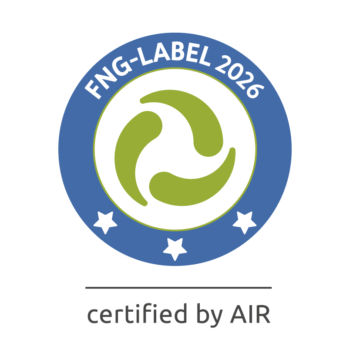Investment Strategy
The fund management focuses on global companies that make a positive contribution to solving challenges such as climate change, water scarcity or demographic change with their products and services and show high profitable growth. Bottom-up stock selection includes classic fundamental data as well as sustainability criteria. Risks, especially in the ESG area, are avoided by excluding companies that do not pursue a sustainability approach and whose activities are not ESG-compliant. The fund management identifies companies that offer added value for the environment and society through their products and/or services.
- Investment in global growth companies of all sizes
- Concentrated portfolio of approximately 40-60 stocks
- Benchmark-agnostic selection
- Focus on positive contribution and sustainable growth
Learn more about our investment philosophy in equity fund management

Fund data
| ISIN | LU1878855821 |
|---|---|
| WKN | A2N6AP |
| Inception date | 11.12.2018 |
| Issue price (12.02.2026) | 170.07 EUR |
| Redemption price (12.02.2026) | 170.07 EUR |
| Fund volume | 23.67 Mio. EUR |
| Share class volume | 14.93 Mio. EUR |
| Currency Fund / Share Class | EUR / EUR |
| Minimum investment | 500,000.00 EUR |
| Asset Manager | Joh. Berenberg, Gossler & Co. KG |
| Management company | Universal-Investment-Luxembourg S.A. |
| Custodian | BNP Paribas Luxembourg Branch |
| Use of income | Distributing |
| End of financial year | 31.12. |
| Registration and Distribution | DE, AT, CH, IT, LU, ES, GB |
| SFDR Classification (Sustainable Finance Disclosure Regulation) | Article 9 |
Costs
| Issue surcharge | none |
|---|---|
| Flat-rate fee p.a. | 0.85% |
| Total Expense Ratio (TER) p.a. | 1.06% |
| Performance fee | none |
Chances and risks
| Chances | Risks |
|---|---|
| High potential returns from equities in the long term. | Fluctuations in value and price losses from stocks and the potential use of derivatives are possible – both overall and in individual stock market years. |
| Growth stocks, small caps, and specific sectors, countries, or market segments may outperform the market in certain phases. | Growth stocks, small caps, and specific sectors, countries, or market segments may underperform during certain periods. |
| Improvement of the risk/return profile through individual stock analysis and active management. | There is no guarantee of success for individual stock analysis and active management. |
| Stabilization of assets in negative capital market phases through professional risk management and intelligent diversification. | Investments and transactions in foreign currencies are subject to exchange rate risks. |
Further details on the opportunities and risks of this fund can be found in the sales prospectus.
Indexed performance
Performance in 12-month periods
Monthly performance
| Year | Jan | Feb | Mar | Apr | May | Jun | Jul | Aug | Sep | Oct | Nov | Dec | YTD |
|---|---|---|---|---|---|---|---|---|---|---|---|---|---|
| 2018 | - | - | - | - | - | - | - | - | - | - | - | -5.13 | -5.13 |
| 2019 | 7.76 | 5.46 | 5.08 | 4.40 | -4.73 | 4.65 | 2.92 | 0.12 | 1.44 | 1.96 | 5.41 | 2.44 | 43.05 |
| 2020 | 1.11 | -5.04 | -10.38 | 11.28 | 5.79 | 3.40 | 3.52 | 6.50 | -0.30 | -1.38 | 6.71 | 5.79 | 28.18 |
| 2021 | 0.94 | 2.11 | 0.04 | 5.70 | -2.21 | 6.27 | 3.02 | 2.51 | -5.24 | 4.96 | -3.51 | -0.04 | 14.75 |
| 2022 | -12.08 | -5.53 | 1.38 | -6.00 | -3.43 | -7.11 | 9.69 | -5.26 | -7.46 | 4.34 | 3.78 | -8.27 | -32.18 |
| 2023 | 6.33 | -1.48 | 1.62 | -1.00 | 3.64 | 1.02 | 1.19 | -3.61 | -3.80 | -5.56 | 8.30 | 4.49 | 10.66 |
| 2024 | 1.75 | 1.98 | 1.02 | -3.47 | 2.23 | 2.54 | 0.56 | 0.87 | 0.01 | -1.43 | 4.95 | 0.94 | 12.37 |
| 2025 | 3.66 | -1.90 | -9.98 | -0.23 | 7.74 | 0.56 | 2.96 | -2.35 | 0.39 | 5.59 | 0.05 | -1.77 | 3.64 |
| 2026 | -0.19 | - | - | - | - | - | - | - | - | - | - | - | -0.21 |
Source: Berenberg, Management company
The charts and tables regarding performance shown here are based on own calculations according to the method developed by the German Investment Funds Association (BVI). They illustrate past performance. Future performance can deviate both positively and negatively from these calculations. Gross performance (BVI method) takes into account all charges at fund level (e.g. management fee), net performance plus the issue surcharge. As no issue surcharge is incurred for this share class the gross performance corresponds to the net performance. Additional charges can arise for individual investors (e.g. custody account fees, commissions and other fees). Also, fees may be charged for the administration of the safe custody account, which will lower the performance. Past performance is not a reliable indicator of future performance.
Performance after issue surcharge
| 1 year | -0.77% |
|---|---|
| 3 years | 18.83% |
| 5 years | -8.68% |
| since inception | 74.10% |
| Max. Drawdown 5 years | -38.75% |
Source: Berenberg, Management company | State: 12 Feb 2026
Risk figures
| Volatility - 1 year | 16.24% |
|---|---|
| Volatility - 3 years | 13.91% |
| Sharpe Ratio - 3 years | 0.21 |
| Maximum Drawdown - since inception | -38.75% |
Currencies
Sectors
Countries
Asset classes
Top Holdings
Monthly market comment
The equity market started the year on a predominantly positive note, driven by optimism at the beginning of the year, although individual sectors fluctuated. In this environment, the Berenberg Sustainable World Equities outperformed its benchmark in the reporting month. Performance was significantly influenced by individual stock developments. Positive contributions came in particular from positions in Taiwan Semiconductor Manufacturing Co. Ltd., which outperformed the broader market after strong results, as well as ASM International N.V., thanks to strong order intake. Ping An Insurance also contributed positively, supported by good operational development and the relative strength of Chinese equities. Conversely, performance was weighed down by the downward trend in the software sector, which impacted stocks like Pegasystems Inc. and reflected investor concerns about a possible disruption by AI.
Portfolio Management

Bernd Deeken
Bernd Deeken has been a Portfolio Manager at Berenberg since April 2011. Within the Equity Fund Management, he oversees funds and special mandates with a focus on sustainability. Previously, he worked in asset management in the area of multi-asset mandates. After his dual studies at the Berufsakademie für Bankwirtschaft in Hannover (including a bank schooling), he completed his Masters in Banking and Finance in Zurich and Aberdeen. He is a Chartered Alternative Investment Analyst (CAIA) and is a CFA Charterholder.

Marco Solleder
Marco Solleder has been a Portfolio Manager at Berenberg since January 2024. Previously, he completed the Berenberg International Graduate Program with assignments in Asset Management, Wealth Management and Corporate Banking. He holds a Bachelor of Science in Business Administration from the University of Regensburg and a Master of Finance from the Frankfurt School of Finance and Management with a stay abroad in Lisbon. Marco Solleder is a CFA Charterholder.
CO₂-Intensity
The fund does not actively manage its carbon footprint, however, emissions data such as CO2 intensity are relevant parameters which can be used to assess the efficient management of a company and the extent of transition risks.
ESG Score
The data provider MSCI ESG uses an ESG score of 0 to 10 to assess the management of material ESG risks of portfolio holdings compared to competitors.
ESG Controversies Screen
Investments in the fund are monitored for ESG controversies and, with the help of MSCI ESG data, flagged according their severity. Thereby, potential ESG risks of investments are identified. In the case of an orange flag (severe controversy), we enter into an active exchange with the company. In the case of a red flag (very severe controversy), the company is excluded.



